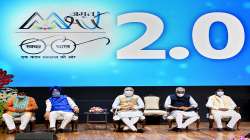Union Cabinet approves AMRUT 2.0 till 2025-26, aims to make cities 'self-sustainable'
AMRUT 2.0 will adopt the principles of circular economy and promote conservation and rejuvenation of surface and groundwater bodies.

The Union Cabinet chaired by PM Modi today approved the Atal Mission for Rejuvenation and Urban Transformation 2.0 (AMRUT 2.0) till 2025-26. The aim is to make the cities ‘water secure’ and ‘self-sustainable’ through circular economy of water, the cabinet said. Functional tap connections will be provided to all households, undertaking water source conservation/ augmentation, rejuvenation of water bodies and wells, recycle/re-use of treated used water and rainwater harvesting.
So far, 1.1 crore household tap connections and 85 lakh sewer/ septage connections have been provided. 6,000 MLD sewage treatment capacity is being developed, of which 1,210 MLD capacity is already created, with provision for reuse of 907 MLD treated sewage. 1,820 parks with area of 3,600 acre have been developed, while another 1,800 acres of area is under greening. So far, 1,700 flooding points have been eliminated.
What is AMRUT 2.0?
The Atal Mission for Rejuvenation and Urban Transformation or AMRUT 2.0 was launched by PM Modi on October 1. It aims to provide 100% coverage of water supply to all households in around 4,700 urban local bodies by providing about 2.68 crore tap connections and 100% coverage of sewerage and septage in 500 AMRUT cities by providing around 2.64 crore sewer/ septage connections, which will benefit more than 10.5 crore people in urban areas.
AMRUT 2.0 will adopt the principles of circular economy and promote conservation and rejuvenation of surface and groundwater bodies. The Mission will promote data-led governance in water management and Technology Sub-Mission to leverage the latest global technologies and skills.
‘Pey Jal Survekshan’ will be conducted to promote progressive competition among cities. The outlay of AMRUT 2.0 is around ₹2.87 lakh crore.